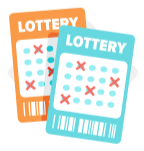Gambling exists in every state, even Hawaii and Utah, where gambling is prohibited by law. But not all gamblers are the same. “Recreational” or “social” gamblers, for instance, buy the occasional lottery ticket, take the rare casino trip or bet small stakes in fantasy sports. But they also are mentally able to quit at any point and prevent catastrophic financial loss.
But when the business or pleasure gets out of control, gambling becomes a real medical condition. Gambling disorder, as it’s known, affects about 1-3 percent of all U.S. adults. According to the Mayo Clinic, “Gambling can stimulate the brain's reward system much like drugs such as alcohol can, leading to addiction.”
That addiction can lead to serious economic consequences. While the gambling industry made a record $71.9 billion in revenue last year, U.S. consumers experience over $100 billion per year in total gambling losses annually. Individually, a male gambling addict accumulates an average debt of between $55,000 and $90,000 whereas a female addict averages $15,000. Most cannot afford to pay back what they owe. As a result, gambling addicts develop a high tendency to amass even more debt, suffer from other health issues, lose their jobs, strain their relationships or even commit crimes.
The gambling problem, however, is much bigger in some states than in others. WalletHub therefore compared the 50 states to determine where excessive gambling is most prevalent. Our data set of 20 key metrics ranges from the presence of illegal gambling operations to lottery sales per capita to the share of adults with gambling disorders.
Top 5 Most Gambling-Addicted States
- Nevada
- South Dakota
- Montana
- Pennsylvania
- Mississippi

Chip Lupo, WalletHub Analyst
Main Findings
Most Gambling-Addicted States
|
Overall Rank* |
State |
Total Score |
Gambling-Friendliness Rank |
Gambling Problem & Treatment Rank |
|---|---|---|---|---|
| 1 | Nevada | 71.83 | 1 | 1 |
| 2 | South Dakota | 65.62 | 2 | 15 |
| 3 | Montana | 58.59 | 7 | 5 |
| 4 | Pennsylvania | 53.75 | 6 | 22 |
| 5 | Mississippi | 52.98 | 8 | 21 |
| 6 | Louisiana | 52.68 | 4 | 37 |
| 7 | Oklahoma | 52.20 | 5 | 34 |
| 8 | West Virginia | 51.87 | 3 | 48 |
| 9 | Oregon | 50.51 | 10 | 8 |
| 10 | New Jersey | 50.41 | 9 | 19 |
| 11 | Texas | 47.77 | 26 | 3 |
| 12 | North Dakota | 46.49 | 11 | 31 |
| 13 | New York | 45.72 | 14 | 26 |
| 14 | Illinois | 45.08 | 15 | 29 |
| 15 | California | 44.72 | 23 | 14 |
| 16 | Rhode Island | 43.60 | 16 | 33 |
| 17 | Wyoming | 43.57 | 24 | 9 |
| 18 | Tennessee | 43.31 | 35 | 4 |
| 19 | Iowa | 42.27 | 17 | 41 |
| 20 | Virginia | 42.05 | 18 | 39 |
| 21 | Michigan | 41.76 | 12 | 47 |
| 22 | Missouri | 41.64 | 28 | 7 |
| 23 | Delaware | 41.59 | 20 | 36 |
| 24 | Colorado | 41.45 | 25 | 23 |
| 25 | Massachusetts | 41.07 | 21 | 32 |
| 26 | Indiana | 40.86 | 19 | 44 |
| 27 | North Carolina | 40.02 | 32 | 11 |
| 28 | Minnesota | 39.99 | 29 | 17 |
| 29 | New Mexico | 39.32 | 13 | 50 |
| 30 | South Carolina | 38.90 | 44 | 6 |
| 31 | Arizona | 38.64 | 31 | 18 |
| 32 | Ohio | 38.00 | 22 | 46 |
| 33 | Idaho | 36.87 | 38 | 20 |
| 34 | Alabama | 36.25 | 39 | 16 |
| 35 | Maryland | 35.86 | 27 | 40 |
| 36 | Washington | 35.00 | 36 | 30 |
| 37 | Arkansas | 34.76 | 37 | 28 |
| 38 | Georgia | 33.87 | 42 | 25 |
| 39 | Kentucky | 33.59 | 30 | 43 |
| 40 | Florida | 33.43 | 34 | 42 |
| 41 | Kansas | 33.38 | 43 | 24 |
| 42 | New Hampshire | 32.63 | 46 | 10 |
| 43 | Hawaii | 31.30 | 49 | 2 |
| 44 | Wisconsin | 30.90 | 41 | 38 |
| 45 | Connecticut | 30.19 | 33 | 49 |
| 46 | Nebraska | 29.52 | 40 | 45 |
| 47 | Maine | 29.26 | 45 | 35 |
| 48 | Vermont | 26.91 | 47 | 27 |
| 49 | Alaska | 26.64 | 48 | 12 |
| 50 | Utah | 24.45 | 50 | 12 |
Note: *No. 1 = Most Addicted
With the exception of “Total Score,” the columns in the table above depict the relative rank of each state, where a rank of 1 represents the worst conditions for that category.

- Most
- T-1. Nevada
- T-1. South Dakota
- T-1. Oklahoma
- 4. North Dakota
- 5. Montana

- Fewest
- T-43. Hawaii
- T-43. South Carolina
- T-43. Tennessee
- T-43. New Hampshire
- T-43. Georgia

- Most
- T-1. Nevada
- T-1. South Dakota
- T-1. Oklahoma
- T-1. Montana
- 5. New Mexico

- Fewest
- T-44. Hawaii
- T-44. South Carolina
- T-44. Tennessee
- T-44. New Hampshire
- T-44. Georgia

- Highest
- T-1. Rhode Island
- T-1. Maryland
- T-1. Massachusetts
- T-1. West Virginia
- T-1. Delaware

- Lowest
- T-46. Nevada
- T-46. Hawaii
- T-46. Alabama
- T-46. Utah
- T-46. Alaska

- Highest
- T-1. Mississippi
- T-1. Minnesota
- T-3. New Jersey
- T-3. Kansas
- 5. Nevada

- Lowest
- T-43. Indiana
- T-43. New Mexico
- T-47. Florida
- T-47. Connecticut
- T-47. Kentucky
- 50. Michigan

- Most
- T-1. Nevada
- T-1. New York
- T-1. Delaware
- T-1. Tennessee
- T-1. Hawaii

- Fewest
- T-36. New Hampshire
- T-36. Utah
- T-36. Wisconsin
- T-36. Kansas
- T-36. Oregon
In-Depth Look at the Most Gambling-Addicted States
Nevada
Nevada is the most gambling-addicted state, and that comes as no surprise considering it’s home to Las Vegas, the gambling capital of America. Around 2.7% of adults in Nevada have gambling disorders, one of the highest rates in the country, and the state ranks number one when it comes to Gamblers Anonymous meetings per capita. Nevada also has the most arrests per capita for illegal gambling.
Nevada also ranks first when it comes to both casinos per capita and gaming machines per capita, giving residents plenty of opportunities to get hooked on this dangerous addiction. The state also has the highest overall gambling revenues in the country.
Nevada’s laws about gambling are also very lax. It allows retail and convenience stores to have electronic gambling machines for customers to play, and it has legalized both sports betting and gambling on horse races.
South Dakota
South Dakota ranks as the second-most gambling-addicted state, with some of the most casinos and gaming machines per capita. It also has a high prevalence of gambling through lottery tickets, with the 10th highest lottery sales per resident age 18+.
South Dakota has legalized betting on fantasy sports, regular sports and horse races, and it allows gambling machines to be put in stores. With so many different legal ways to gamble, it makes sense that many residents have a problem. The grip that gambling has on the Mount Rushmore State is evident in the fact that it has a high number of Gamblers Anonymous meetings per capita.
Montana
Montana ranks third when it comes to gambling addiction, as around 2.5% of the state’s residents have a gambling disorder, one of the highest percentages in the country. It may be difficult for people to overcome their addiction, too, considering the fact that Montana does not have gambling counselors and doesn’t require businesses to train their employees on disordered and problem gambling.
Montana has a very large number of gaming machines and casinos per capita, and it allows residents to bet on sports and horse races. People in The Treasure State can use electronic gambling machines in retail and convenience stores, as well.
Ask the Experts
Over the years, more advanced technology has paved the way for new forms of gambling, such as iGaming, online fantasy sports and video poker. While the gaming industry is no doubt a major contributor to the U.S. economy, its critics argue that gambling leads to social and economic problems, including gambling disorder and regressive taxes in areas where gambling facilities are present. For more insight, we asked the following key questions to a panel of gaming-industry experts:
- Should sports betting be legal in all states? What are the pros and cons?
- Should daily fantasy sports be regulated as gambling?
- On balance, are state lotteries a good idea? Is there a way to make them less regressive?
- What are the signs someone is addicted to gambling? What should friends and family do to help?
- Have the economic struggles of the recent years impacted the gambling industry in any way?
Ask the Experts
Professor, Economics & Accounting - College of the Holy Cross
Read More
Professor of Finance - Loyola University Chicago
Read More
Visiting Associate Teaching Professor of Game Design – Northeastern University CAMD Games
Read More
Ph.D. – Professor, Psychological Science – Ball State University
Read More
Ph.D. – Professor and Director, Nicotine and Tobacco Research Division, Department of Psychiatry and Behavioral Neurosciences – Wayne State School of Medicine
Read More
Ph.D. – Assistant Professor of Communication Studies – Ashland University
Read More
Methodology
In order to determine where gambling addiction is most prevalent and harmful in America, WalletHub compared the 50 states across two key dimensions, “Gambling-Friendliness” and “Gambling Problem & Treatment.”
We evaluated those dimensions using 20 relevant metrics, which are listed below with their corresponding weights. Each metric was graded on a 100-point scale, with a score of 100 representing the highest dependency on gambling.
We then determined each state’s weighted average across all metrics to calculate its overall score and used the resulting scores to rank-order the states.
Gambling-Friendliness – Total Points: 70
- Commercial & Tribal Casinos per Capita: Triple Weight (~13.13 Points)
Note: “Per capita” considers adults aged 18 and older. “Commercial casinos” are defined as land-based, riverboat and racetrack casinos. - Gaming Machines per 1,000 Residents: Double Weight (~8.75 Points)
Note: “Per 1,000 residents” considers adults aged 18 and older. - iGaming Revenues per Capita: Full Weight (~4.38 Points)
Note: “Per capita” considers adults aged 18 and older. - Limited-Stakes Gaming Revenues per Capita: Full Weight (~4.38 Points)
Note: “Per capita” considers adults aged 18 and older. - Commercial Casinos Revenues per Capita: Double Weight (~8.75 Points)
Note: “Per 1,000 residents” considers adults aged 18 and older. - Lottery Sales per Capita: Full Weight (~4.38 Points)
Note: “Per capita” considers adults aged 18 and older. - Presence of Retail/Convenience Gaming: Full Weight (~4.38 Points)
Note: This metrics measures the presence of slot machines in retail or convenience locations. - Presence of Illegal Gambling Operations: Full Weight (~4.38 Points)
- Legality of Daily Fantasy Sports: Full Weight (~4.38 Points)
- Legality of Sports Gambling: Full Weight (~4.38 Points)
- Legality of Horse-Race Gambling: Full Weight (~4.38 Points)
- Google Search Interest Index for “Gambling”: Full Weight (~4.38 Points)
Note: This metric measures Google search interest for the terms “Lottery,” “Casino,” “Slots,” “Blackjack,” “Sport Betting” and “Horse Racing Betting.”
Gambling Problem & Treatment – Total Points: 30
- Share of Adults Aged 18 and Older with Gambling Disorders: Triple Weight (~9.00 Points)
- Gambling Counselors per Capita: Full Weight (~3.00 Points)
Note: “Per 1,000 residents” considers adults aged 18 and older. - “Gamblers Anonymous” Meetings per Capita: Full Weight (~3.00 Points)
Note: “Per capita” considers adults aged 18 and older. - Presence of NCPG Affiliation: Half Weight (~1.50 Points)
Note: “NCPG” is an acronym for National Council on Problem Gambling. - Employee Training on Disordered- & Problem-Gambling Statuses & Regulations: Full Weight (~3.00 Points)
- Spending on Problem Gambling Services per Capita: Half Weight (~1.50 Points)
- Statewide Self-Exclusion Statute: Full Weight (~3.00 Points)
Note: This binary metric measures the presence or absence of self-exclusion policy in a state.
Self-exclusion (or self-banning) is a voluntary process where a person with a gambling concern excludes themselves from areas of specific gambling venues, or online providers.
It can provide a concrete tool to help keep you safe from excessive gambling. - Gambling-Related Arrests per Capita: Double Weight (~6.00 Points)
Note: “Per capita” considers adults aged 18 and older.
Sources: Data used to create this ranking were collected as of March 25, 2025 from the U.S. Census Bureau, American Gaming Association, RubinBrown, National Council on Problem Gambling, National Association of Administrators for Disordered Gambling Services, North American Association of State and Provincial Lotteries, Federal Bureau of Investigation, Legal Sports Report, PlayUSA, Google Ads, Gamblers Anonymous and Virginia Commonwealth University’s Dr. Jay S. Albanese.








WalletHub experts are widely quoted. Contact our media team to schedule an interview.